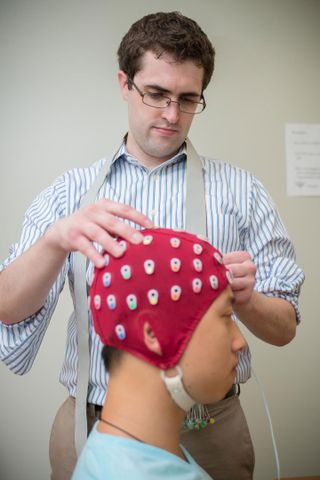Why Kids Should Pay Attention to Their Mistakes

Kids who think they can get smarter if they work hard are more likely to bounce back from their mistakes than those who think their level of intelligence is set in stone, a new study finds.
This may be because kids with a so-called growth mind-set, who believe intelligence is changeable, are more likely to focus on their mistakes than those with a fixed mind-set, who believe intelligence is not changeable, the researchers said. [25 Scientific Tips for Raising Happy (& Healthy) Kids]
"The main implication here is that we should pay close attention to our mistakes and use them as opportunities to learn," rather than glossing over mistakes, study researcher Hans Schroder, a doctoral student in psychology at Michigan State University, said in a statement.

In the study, the researchers first interviewed 123 children (average age of 7) to determine whether they had a growth mindset or a fixed mindset. The children were asked questions such as "imagine a kid who thinks that you can get smarter and smarter all the time…how much do you agree with this kid?"
Then, the researchers monitored the children's brain waves while the kids performed a task on a computer, which involved pressing the spacebar when they saw certain images.
The researchers analyzed the brain responses that occurred within half a second of the children making a mistake on the task. In general, a bigger brain response means that a person is paying more attention to her or his mistake, the researchers said.
The study found that children with a growth mind-set were more likely to have a larger brain response after making a mistake, compared with children who had a fixed mind-set. This suggests that children with a growth mind-set were paying more attention to their mistakes, the researchers said. What's more, children with such a mind-set were more likely to improve their accuracy on the task after they made a mistake, compared with children who had a fixed mind-set, the study showed.
Sign up for the Live Science daily newsletter now
Get the world’s most fascinating discoveries delivered straight to your inbox.
The study also found that children with a fixed mind-set could still improve their accuracy on the task, but only if they paid close attention to their mistakes.
The findings may have some practical implications for parents and teachers.
"It is a seemingly natural reaction to comfort children when they make mistakes," but some ways of doing this may distract children from learning from their mistakes, the researchers said.
Instead of shying away from children's mistakes, parents and teachers could offer this advice: "Mistakes happen, so let's try to pay attention to what went wrong and figure it out," Schroder said.
The study was published online Jan. 16 in the journal Developmental Cognitive Neuroscience
Original article on Live Science.

Rachael is a Live Science contributor, and was a former channel editor and senior writer for Live Science between 2010 and 2022. She has a master's degree in journalism from New York University's Science, Health and Environmental Reporting Program. She also holds a B.S. in molecular biology and an M.S. in biology from the University of California, San Diego. Her work has appeared in Scienceline, The Washington Post and Scientific American.
Most Popular



